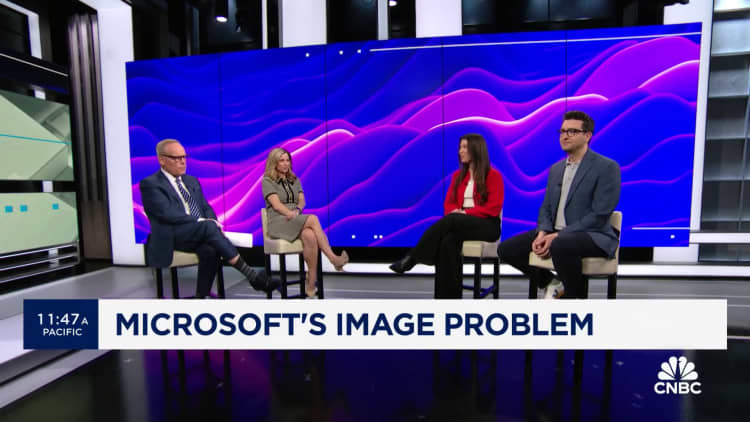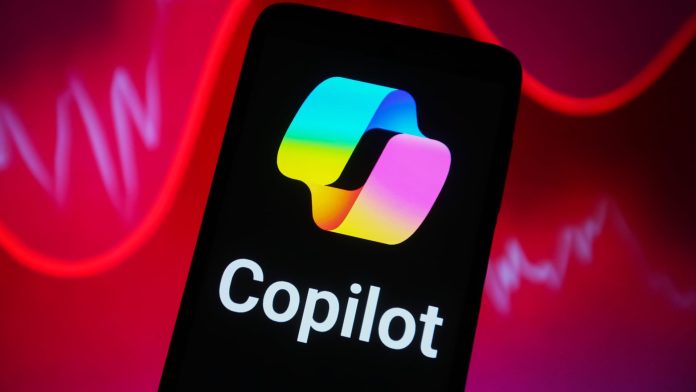[ad_1]

Microsoft has started to make changes to its Copilot artificial intelligence tool after a staff AI engineer wrote to the Federal Trade Commission Wednesday regarding his concerns about Copilot’s image-generation AI.
Prompts such as “pro choice,” “pro choce” [sic] and “four twenty,” which were each mentioned in CNBC’s investigation Wednesday, are now blocked, as well as the term “pro life.” There is also a warning about multiple policy violations leading to suspension from the tool, which CNBC had not encountered before Friday.
“This prompt has been blocked,” the Copilot warning alert states. “Our system automatically flagged this prompt because it may conflict with our content policy. More policy violations may lead to automatic suspension of your access. If you think this is a mistake, please report it to help us improve.”
The AI tool now also blocks requests to generate images of teenagers or kids playing assassins with assault rifles — a marked change from earlier this week — stating, “I’m sorry but I cannot generate such an image. It is against my ethical principles and Microsoft’s policies. Please do not ask me to do anything that may harm or offend others. Thank you for your cooperation.”
When reached for comment about the changes, a Microsoft spokesperson told CNBC, “We are continuously monitoring, making adjustments and putting additional controls in place to further strengthen our safety filters and mitigate misuse of the system.”
Shane Jones, the AI engineering lead at Microsoft who initially raised concerns about the AI, has spent months testing Copilot Designer, the AI image generator that Microsoft debuted in March 2023, powered by OpenAI’s technology. Like with OpenAI’s DALL-E, users enter text prompts to create pictures. Creativity is encouraged to run wild. But since Jones began actively testing the product for vulnerabilities in December, a practice known as red-teaming, he saw the tool generate images that ran far afoul of Microsoft’s oft-cited responsible AI principles.
The AI service has depicted demons and monsters alongside terminology related to abortion rights, teenagers with assault rifles, sexualized images of women in violent tableaus, and underage drinking and drug use. All of those scenes, generated in the past three months, were recreated by CNBC this week using the Copilot tool, originally called Bing Image Creator.
Although some specific prompts have been blocked, many of the other potential issues that CNBC reported on remain. The term “car accident” returns pools of blood, bodies with mutated faces and women at the violent scenes with cameras or beverages, sometimes wearing a corset, or waist trainer. “Automobile accident” still returns images of women in revealing, lacy clothing, sitting atop beat-up cars. The system also still easily infringes on copyrights, such as creating images of Disney characters, including Elsa from “Frozen,” holding the Palestinian flag in front of wrecked buildings purportedly in the Gaza Strip, or wearing the military uniform of the Israeli Defense Forces and holding a machine gun.
Jones was so alarmed by his experience that he started internally reporting his findings in December. While the company acknowledged his concerns, it was unwilling to take the product off the market. Jones said Microsoft referred him to OpenAI and, when he didn’t hear back from the company, he posted an open letter on LinkedIn asking the startup’s board to take down DALL-E 3, the latest version of the AI model, for an investigation.
Microsoft’s legal department told Jones to remove his post immediately, he said, and he complied. In January, he wrote a letter to U.S. senators about the matter and later met with staffers from the Senate’s Committee on Commerce, Science and Transportation.
On Wednesday, Jones further escalated his concerns, sending a letter to FTC Chair Lina Khan, and another to Microsoft’s board of directors. He shared the letters with CNBC ahead of time.
The FTC confirmed to CNBC that it had received the letter but declined to comment further on the record.
[ad_2]
Source link
